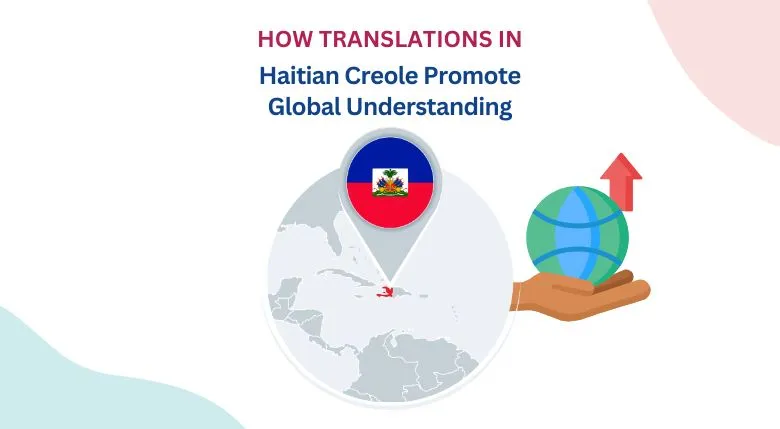 Whenever we think of Haiti, we imagine a beautiful picture of its vibrant culture, buoyant landscapes, and rich traditional history. However, Haiti is way more than its physical beauty. It has abundant opportunities once you overcome linguistic and cultural boundaries and connect this beautiful island with the rest of the world. Language translations play a key role in establishing this connection.
Whenever we think of Haiti, we imagine a beautiful picture of its vibrant culture, buoyant landscapes, and rich traditional history. However, Haiti is way more than its physical beauty. It has abundant opportunities once you overcome linguistic and cultural boundaries and connect this beautiful island with the rest of the world. Language translations play a key role in establishing this connection.
Haiti’s Linguistic Identity
Haiti is a bilingual nation, which means that it officially recognizes both Haitian Creole as well as French, with Creole serving as the mother tongue for most of the citizens. Accurate Haitian Creole translations are important in fostering a deep understanding of the culture and people of the country within the global community.
Understanding Haiti
Haiti has a unique linguistic background that sets it apart from other nations in the Caribbean. Haitian Creole, the country’s primary language, derives from French Language and various West African languages, incorporating vocabulary from indigenous Taino and Spanish influences. A smaller percentage of the population uses French, which serves as the medium of formal education, diplomacy, and administration. Despite the shared vocabulary roots between Creole and Haitian French, there is a difference in the grammar syntax and the cultural context.
Undertaking translations from Haitian French or Creole into highly demanding languages like English, Spanish, or Mandarin is not a straightforward task. As Creole is deeply intertwined with the Haitian identity, its rich cultural expressions, idioms, proverbs, and everyday jargon generally lack direct equivalents in other languages.
For instance, the Creole phrase ‘Tout moun se moun’ converts into ‘Everyone is a person’ in English, but this translation misses the deeper meanings of equality and shared humanity expressed in the Creole context.
Another unique aspect of translating Creole is maintaining its cultural integrity. Since language is not just about words; it’s about understanding the context, meaning, and tone. Linguists should carefully balance literal accuracy with the need to conserve the heart of the culture. This is especially important when translators handle sensitive content related to Haiti’s history, politics, or religion, as misinterpretation can lead to cultural misunderstandings and harmful stereotypes.
It might interest you to explore the role of German translations in the success of global businesses. If you want to learn more, you can read this informational blog on How Global Businesses are Growing Using German Translation Services.
Benefits of Undertaking Haitian Translations
- Cultural promotion
Translation in this language promotes Haiti’s rich culture, including its music, literature, and art, and presents it to a global audience, increasing its reach in global markets and gaining international recognition. - Tourism Growth
With accurate translations of materials like tourist guides, websites, and brochures, the island can attract tourists by making its destinations and attractions more accessible to non-Haitian speakers. - Business Expansion
By converting business materials and legal documents, the companies based in Haiti can engage in international trade, attract foreign investments, and form global partnerships. Efficient translations will also invite foreign direct investments to the island and generate employment opportunities for the natives. - Healthcare communication
Accuracy in translations ensures that effective communication between Haitian health care providers and international organizations takes place. These collaborations can improve health care services during public health crises. - Enhances diplomacy and cooperation
Language conversions allow for smoother diplomatic interactions between Haiti and other nations. This improves cooperation in international policies and treaties and fosters the country’s global engagement across multiple sectors, promoting mutual understanding and growth.
It might pique your interest to explore the role of translation services in regional languages to determine success. If you want to learn more, you can consider reading this engaging blog on How Regional Language Translation Services Determine Success .
ARE YOU SEARCHING FOR PROFESSIONAL HAITIAN CREOLE TRANSLATIONS?
Stop your search and get Somya Translators’ exemplary translation services and enhance your business.
Key Challenges in Translating Haitian
- Lack of Standardization
The Haitian Creole has different dialects and informal expressions that vary from region to region. This makes it very challenging to produce standardized translations that are uniform. - Cultural Nuances
The island’s languages deeply connect to its culture, producing expressions and jargon that lack relevant translations in other languages. Translating such cultural nuances and expressions with precision requires the assistance of expert translators who have a deep understanding of the island’s culture. - Complex grammar and syntax
While Creole’s grammar appears to be simple, translators often find it difficult to maintain the correct sentence structure and syntax, especially when compared to languages with more rigid grammatical rules like German or Hebrew.
Conclusion
Translating Haitian Creole into major world languages is more than just a linguistic task––it acts as a bridge to connect the island with the world and build global understanding. By embracing Haiti’s linguistic diversity, professional translators can access several opportunities for cultural exchange and business collaboration. Investing in expert language service providers like Somya Translators, who offer certified Creole translations, can be a game changer. Contact us today and avail yourself of a free quote!







